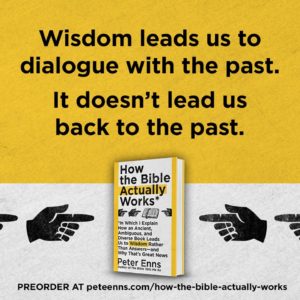Disclosure: I received a free, advance copy of How the Bible Actually Works from HarperOne as a member of the book’s launch team.
Before picking up Pete Enns’ latest book, How the Bible Actually Works, you may want to ask yourself a few questions.
Are you happy with your Christian theology, by and large? Do all the various pieces of the Bible fit together nicely for you? Are you content with seeing the Bible as a unified, self explanatory whole?
If you can answer yes to one or more of these questions, you will be better off leaving this book on the shelf (be it digital or physical). However, if cracks are starting to form in the formerly impregnable wall of your Christian belief, this book might be right up your alley.
Over the course of 280 pages, Enns lays out the case for how the Biblical authors reimagined God and reinterpreted their people’s history to better suit the theological needs of their times and that of the cultures they found themselves in.
The titular footnote (Enns loves footnotes) helps spell things out a bit: “In Which I Explain How an Ancient, Ambiguous, and Diverse Books Leads Us to Wisdom Rather Than Answers – and Why That’s Great News.”
The “ancient” bit is pretty self explanatory. The “ambiguous” and “diverse” parts need to be fleshed out a bit. An example of what Enns means by ambiguous is that even the laws delivered at Mt. Sinai tend to be a bit vague. Yes, you’re not supposed to work on the Sabbath but how much effort constitutes work, exactly? Proverbs says discipline your children while there is hope but what kind of discipline is best and how do you know when all hope is lost?
An example of diversity would be Proverbs 26:4-5. Do you answer a fool to keep him or her from being wise in his/her own eyes or do you not? Another example from Proverbs would be the wealth of the rich. Are riches their fortress or is their perceived security just in their imaginations?
And this ambiguity and diversity is where wisdom comes in. You have to sit and think things through when working out what the Bible is saying and how it applies to your present situation. The Bible doesn’t consist of golden tablets from Heaven comprising a rule book that is immediately applicable to all situations, at all times. Don’t get turned off by apparent contradictions or try to explain them away but rather work out why this diversity is there and what God is trying to tell you by having such divergent opinions bound up in the same volume.
The book is somewhat repetitive but avoids being dull as Enns injects a healthy dose of sarcasm and overall snark into his theological discourse. He provides numerous examples of how he believes the entire Bible works as wisdom literature and how it’s our sacred duty to reimagine God as fits our culture and times.
Again, if you’re perfectly satisfied with traditional American theology as presented in the 20th and 21st centuries, this probably isn’t your book. However, if you’ve noticed some of the diversity (inconsistencies?) scattered throughout the Bible and they are starting to bother you, How the Bible Actually Works could be just the book you need to let you see the Bible in fresh new way.

